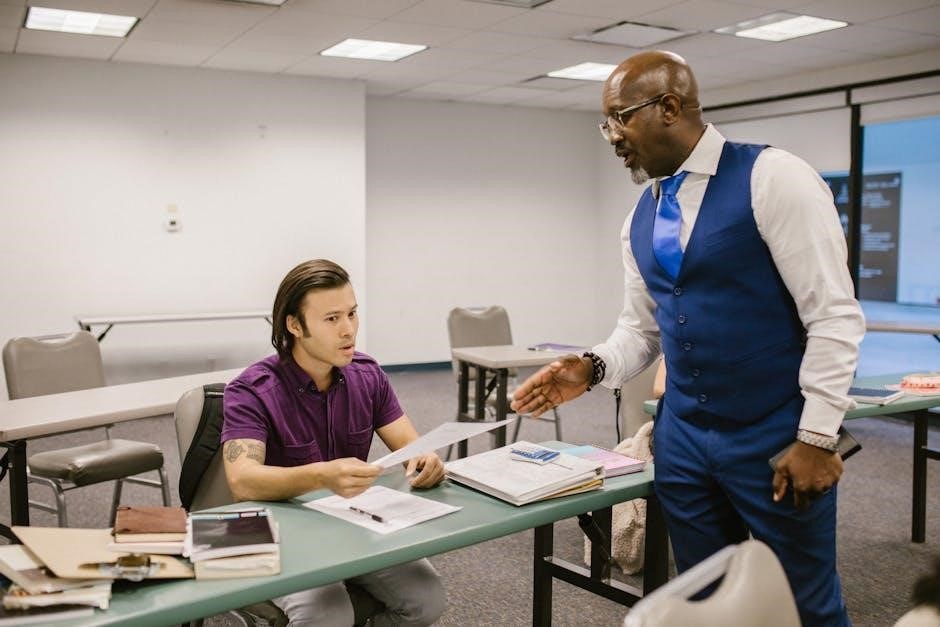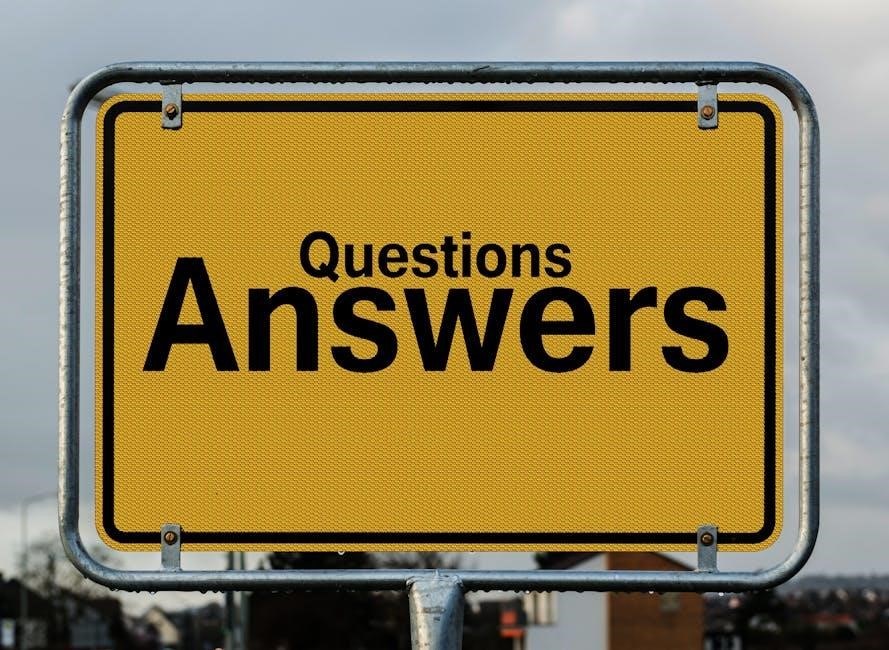smart serve exam questions and answers pdf
The Smart Serve Exam Questions and Answers PDF provides a comprehensive guide for responsible alcohol service, offering insights, practical examples, and expert tips to ensure exam success.
Overview of the Smart Serve Program
The Smart Serve program is designed to promote responsible alcohol service, ensuring legal compliance and public safety. It equips servers with essential knowledge to prevent underage drinking, recognize impairment, and manage difficult situations. The program emphasizes ethical practices, civil liability awareness, and practical skills for real-world application. By completing the certification, individuals gain the expertise needed to serve alcohol responsibly and contribute to a safer environment in the hospitality industry.
Importance of the Exam for Responsible Alcohol Service
The Smart Serve exam is crucial for ensuring responsible alcohol service, as it validates knowledge of legal requirements, underage drinking prevention, and liability risks. Passing the exam demonstrates a server’s commitment to ethical practices, reducing risks for both patrons and establishments. It fosters a culture of accountability and safety, making it a vital requirement for professionals in the hospitality industry to legally and effectively serve alcohol.
Why Use PDF Resources for Preparation?
PDF resources are ideal for Smart Serve exam preparation due to their portability and accessibility. They allow candidates to study anywhere, anytime, without internet reliance. PDFs often contain comprehensive guides, sample questions, and flashcards, enabling effective revision. Their clear formatting and search functionality make it easy to focus on key topics, ensuring efficient and organized learning. This convenience enhances retention and confidence, making PDFs a preferred choice for exam success.

Key Topics Covered in the Smart Serve Exam
The exam covers responsible alcohol service, legal requirements, underage drinking prevention, civil liability, and calculating standard drinks, ensuring servers are well-prepared for real-world scenarios.
Responsible Alcohol Service and Legal Requirements
Understanding legal obligations is crucial for servers. This section covers Ontario’s liquor laws, age verification, and serving limits to prevent underage drinking and promote a safe environment. Servers must know when to refuse service and how to handle intoxicated patrons legally. Compliance with these regulations is essential to avoid penalties and ensure public safety. Proper training and awareness of legal standards are emphasized to maintain responsible alcohol service practices effectively.
Identifying and Preventing Underage Drinking
Recognizing underage drinkers is vital for responsible service. This section provides strategies to identify minors, such as checking valid ID types and understanding common fake ID tactics. Servers are trained to refuse service politely and confidently. Preventing underage drinking involves monitoring patron behavior and using effective communication to maintain compliance with legal standards. These practices help create a safer environment and reduce risks associated with underage alcohol consumption effectively.
Understanding Civil Liability and Its Implications
Civil liability refers to legal responsibility for damages caused by serving alcohol to intoxicated patrons. Servers can face lawsuits if their actions result in harm or property damage. Understanding this implication is crucial, as it highlights the importance of adhering to responsible service practices. Legal consequences may include financial compensation to victims, making it essential for servers to monitor patron behavior and refuse service when necessary to minimize risks and avoid potential legal actions effectively.
Calculating Standard Drinks and Alcohol Content
The formula for calculating a standard drink is: 60 × alcohol percentage × amount (in ounces). This helps determine the alcohol content in beverages, essential for responsible service. Understanding standard drinks allows servers to monitor consumption accurately, preventing over-serving. For example, a 12-ounce beer with 5% alcohol contains 0.6 ounces of pure alcohol. This calculation ensures servers can assess patron intake effectively, promoting safe and legal alcohol service practices consistently.

Sample Questions and Answers from the Exam
The PDF includes multiple-choice, true/false, and scenario-based questions with answers, such as: “What best describes civil liability?” Answer: “You could be sued for damages.” These examples aid exam preparation effectively.
Multiple-Choice Questions on Alcohol Service Laws
Multiple-choice questions in the PDF cover essential alcohol service laws, such as legal drinking age, ID requirements, and civil liability. For example, “What best describes civil liability?” with options like “You could be sued for damages” or “You could be charged with a crime.” These questions help test understanding of legal responsibilities and consequences, ensuring servers are well-prepared to operate within the law and minimize risks effectively in real-world scenarios.
True or False Questions on Responsible Serving Practices
True or False questions assess knowledge of responsible serving practices, such as recognizing impairment signs and handling difficult situations. For instance, “It is legal to serve alcohol to someone who appears intoxicated.” Answering these correctly demonstrates understanding of ethical and legal standards, ensuring servers can make informed decisions to prevent underage drinking and promote a safe environment, aligning with the program’s goals of responsible alcohol service and patron safety;
Scenario-Based Questions for Real-World Application
Scenario-based questions simulate real-life situations, testing practical application of knowledge. For example, “A patron appears intoxicated. What should you do?” These questions assess decision-making skills, ensuring servers can handle challenges like refusing service, managing conflicts, or assisting impaired individuals. They prepare candidates for ethical dilemmas and legal responsibilities, reinforcing the importance of responsible alcohol service in real-world contexts, such as preventing underage drinking and promoting patron safety effectively.
Fill-in-the-Blank Questions on Key Concepts
Fill-in-the-blank questions test understanding of essential terminology and concepts. Examples include: “Civil liability occurs when a server is sued for ____.” or “A standard drink is calculated using the formula: ____.” These questions ensure mastery of critical terms like blood alcohol content, underage drinking laws, and responsible serving practices, reinforcing foundational knowledge needed for real-world application in alcohol service environments effectively.

Expert Tips for Preparing for the Smart Serve Exam
Use flashcards for quick revision, focus on understanding key concepts, and practice with sample questions to enhance retention and confidence for the exam.
Effective Study Techniques for Better Retention
Incorporate active learning methods like flashcards and practice exams to reinforce memory. Break study sessions into manageable chunks, focusing on key topics such as legal requirements and drink calculations. Engage with study groups to discuss challenging concepts and share insights. Regularly review notes and PDF guides to ensure comprehensive understanding and retention of essential material for the Smart Serve exam.
Time Management Strategies During the Exam
Allocate time evenly across all sections to avoid rushing. Skim through the entire exam first to identify easier questions and tackle them promptly. Set a timer for each question to maintain pace. Avoid spending too long on a single question—mark it for review and return later if time permits. This approach ensures efficient use of the allotted time and helps maximize scores on the Smart Serve exam.
Common Mistakes to Avoid in the Test
Frequently, test-takers overlook instructions, misread questions, or select multiple answers for single-choice queries. Another pitfall is neglecting to review responses, leading to uncorrected errors. Additionally, some individuals spend excessive time on challenging questions, impacting their ability to complete the exam. To prevent these issues, practice time management, read carefully, and ensure all answers are reviewed before submission. These strategies help avoid common pitfalls and improve overall performance on the Smart Serve exam.
Utilizing Flashcards for Quick Revision
Flashcards are an excellent tool for quick and effective revision, helping to reinforce key concepts and definitions. By creating physical or digital cards, users can memorize important terms, legal requirements, and responsible serving practices. Organize cards by categories, such as alcohol laws or impairment signs, for focused study. Regular review enhances retention, ensuring confidence and preparedness for the Smart Serve exam. Example: “What defines civil liability?” – “Liability for damages due to negligence.”

Understanding Civil Liability in Alcohol Service
Civil liability refers to legal responsibility for damages caused by negligent alcohol service. It emphasizes the importance of adhering to responsible practices to avoid potential lawsuits and financial consequences.
What Constitutes Civil Liability?
Civil liability in alcohol service occurs when a server or establishment fails to adhere to legal standards, resulting in harm to patrons or third parties. This can include overserving alcohol to individuals who later cause harm, such as accidents or injuries. Liability may lead to lawsuits, where the server or business can be held financially responsible for damages. Understanding these risks is crucial for responsible service practices and legal compliance.
Consequences of Civil Liability for Servers
Civil liability for servers can result in significant financial and professional repercussions. Legal actions may require servers to pay damages or settlements, impacting their personal finances. Additionally, a finding of liability can harm their reputation and career prospects in the hospitality industry. Understanding legal responsibilities and adhering to best practices is essential to minimize these risks and ensure responsible alcohol service.
How to Minimize Risk as a Server
To minimize risk, servers must understand legal responsibilities and adhere to best practices. Refusing service to intoxicated patrons, monitoring alcohol consumption, and accurately calculating standard drinks are critical. Ensuring compliance with age verification laws and maintaining awareness of civil liability implications can protect against legal consequences. Utilizing resources like the Smart Serve Exam Questions and Answers PDF helps servers stay informed and prepared, reducing potential risks in their professional roles.

Calculating Standard Drinks
Calculating standard drinks involves multiplying the alcohol percentage by the amount in ounces, divided by 60; This formula helps servers understand drink strength and portion sizes accurately.
Formula for Determining Standard Drinks
A standard drink is calculated using the formula: 60 × alcohol percentage × amount (in ounces). This formula helps determine the alcohol content in beverages, enabling accurate assessment of drink strength. Understanding this formula is crucial for servers to measure portions effectively and prevent over-serving. It ensures compliance with legal standards and supports responsible alcohol service, making it a key concept in Smart Serve certification and exam preparation.
Practical Examples for Better Understanding
For example, a 12-ounce beer with 5% alcohol content contains 0.6 standard drinks (60 × 0.05 × 12). Similarly, a 5-ounce glass of wine at 12% alcohol equals 0.6 standard drinks (60 × 0.12 × 5). These examples help servers apply the formula in real-world scenarios, ensuring accurate measurements and responsible alcohol service. Practical examples like these are essential for understanding and implementing the standard drink calculation effectively in everyday situations.
Importance of Accurate Calculation in Service
Accurate calculation of standard drinks is crucial for responsible alcohol service, as it helps servers monitor patron intake and prevent over-serving. Misjudging alcohol content can lead to intoxication, legal issues, and civil liability. Correct calculations ensure compliance with legal standards and promote a safe environment. Servers who accurately assess drink content contribute to reducing alcohol-related harm and maintaining professional service standards, which are essential for protecting both patrons and establishments.

Handling Difficult Situations in Alcohol Service
Mastering techniques to refuse service, de-escalate conflicts, and assess patron behavior is essential for maintaining safety and legal compliance in alcohol service environments.
Techniques for Refusing Service to Intoxicated Patrons
Refusing service to intoxicated patrons requires a firm yet respectful approach. Use “I” statements to avoid blame, such as “I can’t serve you more alcohol.” Involve a manager if resistance occurs. Stay calm and maintain control of the situation. Document incidents for legal purposes. Refusal must be clear and direct to prevent liability. These techniques ensure compliance with regulations and promote a safe environment. Proper refusal methods are critical for minimizing risks and legal consequences. Always prioritize professionalism and safety.
De-escalation Strategies for Conflict Situations
De-escalation strategies are essential for managing conflicts in alcohol service. Stay calm, maintain a neutral tone, and avoid confrontational language. Use open body language to show approachability. Active listening and empathy can diffuse tension. Acknowledge the patron’s feelings without agreeing or disagreeing. Offer solutions, such as water or a break, to redirect the situation. If necessary, involve a manager or security. Prioritize safety and professionalism to resolve conflicts effectively while minimizing risks and ensuring responsible service.
Assessing Patron Behavior for Responsible Service
Assessing patron behavior is crucial for responsible alcohol service. Observe signs of impairment, such as slurred speech, unsteady balance, or aggressive behavior. Understand legal and ethical responsibilities to refuse service to intoxicated patrons. Use discretion and professionalism to handle situations without escalating conflicts. Accurate assessment ensures a safe environment, promotes responsible serving practices, and minimizes liability risks for both establishments and staff. Regular training and awareness are key to refining these skills effectively.
Physical and Mental Impairment in Alcohol Service
Recognizing physical and mental impairment is vital for responsible alcohol service. Servers must identify signs like slurred speech, dizziness, or aggressive behavior to ensure legal compliance and safety.
Recognizing Signs of Impairment
Recognizing signs of impairment is crucial for responsible alcohol service. Common indicators include slurred speech, dizziness, aggressive behavior, or bloodshot eyes. Servers should also note slow reactions, difficulty focusing, or unsteady movements. These signs suggest a patron may be intoxicated or under the influence of substances. Accurate identification helps prevent over-serving and ensures compliance with legal and ethical standards. Proper training enhances a server’s ability to assess impairment effectively and take appropriate actions to maintain a safe environment. Early intervention is key to responsible service.
Legal and Ethical Responsibilities
Understanding legal and ethical responsibilities is vital for servers. Civil liability can result from serving intoxicated patrons, potentially leading to lawsuits. Servers must refuse service to those visibly impaired and ensure compliance with alcohol laws. Ethical responsibilities include protecting patrons from harm and upholding public safety. Failure to adhere to these standards can result in legal consequences, emphasizing the importance of responsible service practices. Proper training and awareness are essential for meeting these obligations effectively.
Appropriate Responses to Impaired Patrons
When dealing with impaired patrons, it is crucial to respond professionally and responsibly. Servers should politely refuse further service, offer water, and ensure the patron’s safety. Engaging in open communication to assess their condition is key. If necessary, involve management or security to assist. Providing alternative solutions, such as arranging transportation, demonstrates ethical responsibility. Ignoring signs of impairment can lead to legal consequences, making prompt and appropriate action essential for maintaining a safe environment.

Resources for Exam Preparation
Access comprehensive PDF guides, online practice exams, and flashcards for effective Smart Serve exam preparation. These resources offer detailed insights, ensuring thorough understanding and confidence for success;
Recommended Study Materials and Guides
Utilize the SMART Serve Actual Exam Questions and Answers 2025 for authentic practice. Download comprehensive guides from platforms like Docsity, offering updated materials. Flashcards and detailed study manuals are also available, ensuring thorough preparation. These resources provide insights into key concepts, legal requirements, and real-world scenarios, helping candidates understand responsible alcohol service principles. Accessible in PDF format, they are ideal for quick revision and in-depth study, covering all exam topics effectively.
Online Platforms for Practice Exams
Enhance your preparation with online platforms like Docsity, offering authentic SMART Serve Exam Questions and Answers in PDF. These platforms provide practice exams, flashcards, and interactive tools to test knowledge. Access updated materials, including scenario-based questions and multiple-choice formats, to simulate real exam conditions. Utilize these resources to identify weak areas and improve understanding of responsible alcohol service, ensuring confidence and readiness for the certification exam.
Benefits of Using PDF Guides for Revision
PDF guides for Smart Serve exam preparation offer convenience and accessibility, allowing users to study anytime, anywhere. They provide comprehensive content, including questions, answers, and study materials, ensuring thorough preparation. Portable and easy to access, PDFs are ideal for last-minute reviews. Utilize them to reinforce key concepts, practice with sample questions, and build confidence for the exam. They are a valuable resource for efficient and effective revision, helping candidates achieve success in their certification.

Common Mistakes to Avoid in the Exam
Common mistakes include misreading questions, poor time management, and neglecting to review answers. These errors can lead to unnecessary incorrect responses and lower scores significantly.
Misunderstanding Key Concepts
Misunderstanding key concepts, such as civil liability or standard drink calculations, can lead to incorrect answers. These concepts are crucial for responsible alcohol service and legal compliance. Many candidates confuse civil liability with criminal charges, not realizing it involves being sued for damages. Similarly, standard drink formulas are often miscalculated due to incorrect alcohol percentage or volume measurements. To avoid this, thoroughly review the Smart Serve PDF guide and practice with sample questions to ensure clarity and understanding. Proper preparation helps prevent these common errors and ensures confidence during the exam.
Time Management Errors
Time management errors are common during the Smart Serve exam, leading to rushed decisions and incomplete answers. Many candidates spend too much time on difficult questions, leaving insufficient time for simpler ones. This can result in missed questions and a lower score. To avoid this, allocate a set amount of time per question and stick to it. Use the process of elimination for challenging questions and move forward to ensure all questions are attempted. Proper time management is crucial for achieving a passing score.
Neglecting to Review Answers
Neglecting to review answers is a common mistake that can lead to overlooked errors. Candidates often skip this step due to time constraints, but it can result in incorrect responses going unnoticed. Reviewing answers ensures accuracy, especially for questions where second thoughts may arise. Always allocate time to revisit your responses, checking for clarity and completeness. This practice helps catch mistakes and improves overall performance, making it a crucial step in achieving exam success.

Future Trends in Smart Serve Certification
The Smart Serve certification is expected to evolve with updated exam content, advanced training methods, and a growing emphasis on its importance in the service industry.
Updates in Exam Content and Format
Future Smart Serve exams will feature updated content reflecting current laws and practices, with a focus on scenario-based questions. The format may incorporate interactive elements for better engagement, ensuring servers are well-prepared for real-world challenges. These changes aim to enhance understanding and practical application, aligning with industry trends and regulatory requirements to promote responsible alcohol service effectively.
Advancements in Training Methods
Modern training methods for Smart Serve certification now incorporate interactive modules and AI-driven tools, enhancing engagement and accessibility. Online platforms offer personalized learning experiences, allowing candidates to practice with real-world scenarios. Additionally, the use of PDF guides and flashcards has become more prevalent, enabling efficient revision. These advancements ensure that servers gain practical insights and are better equipped to handle challenging situations, aligning with the evolving demands of responsible alcohol service.
Increasing Importance of Certification
The demand for Smart Serve certification is growing as establishments prioritize responsible alcohol service. Employers increasingly require certification to mitigate liability risks and ensure compliance with legal standards.Certification demonstrates a server’s commitment to ethical practices, enhancing professionalism and career opportunities. With the rise in awareness of alcohol-related issues, the importance of obtaining and maintaining Smart Serve certification continues to escalate, making it a vital credential in the service industry.
